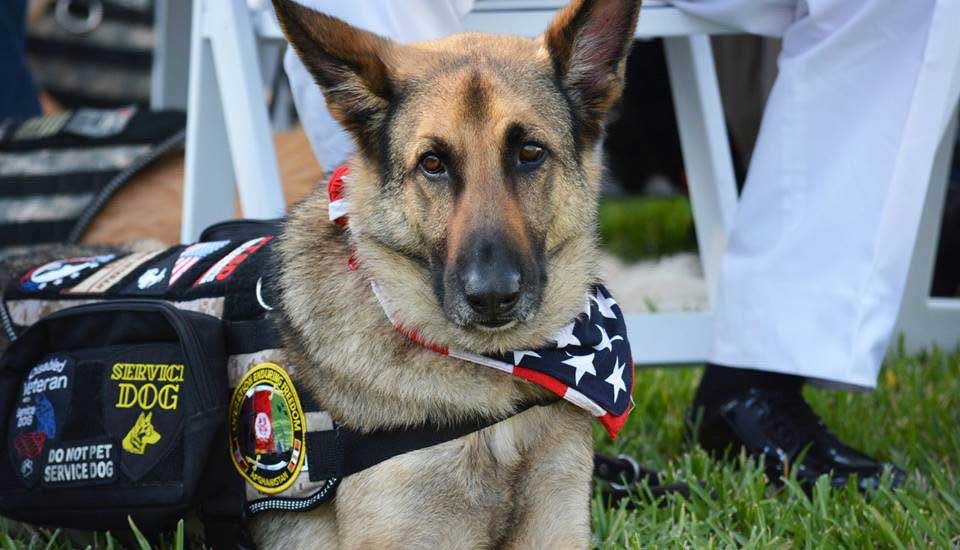Purdue Sniffing Out the Science of PTSD Service Dogs
 K9s For Warriors will invite veterans nationwide with PTSD to be part of the Purdue study.
K9s For Warriors will invite veterans nationwide with PTSD to be part of the Purdue study.
Subscriber Benefit
As a subscriber you can listen to articles at work, in the car, or while you work out. Subscribe NowAfter post-traumatic stress disorder (PTSD) left U.S. Army veteran Bryan Foltz suicidal, “numb” and paralyzed by paranoia, he now says “I’m a different me.” But it wasn’t therapy or medication he credits for saving his life; he says his service dog rescued him from “dark and scary” days. However, the voices of veterans have little validity in the world of scientific research, which has led a Purdue University professor to conduct the first clinical trial to examine the physiological impact of PTSD service dogs.
“Although we see these positive stories, we don’t have any scientific evidence behind this. There’s a real push for evidence-based treatment, and [PTSD service dogs] wouldn’t fall into that category at the moment,” says Purdue Assistant Professor of Human-Animal Interaction Dr. Maggie O’Haire. “There are really long waiting lists for these dogs, because there aren’t resources to support more dogs; there isn’t that support without the scientific evidence behind it.”
While the duties of psychiatric service dogs may be less visible than guide dogs, for example, they’re trained to help relieve the symptoms of panic or anxiety, such as waking their handlers from nightmares and creating physical space around their handlers in public to help them feel safe.
Foltz’s battle with PTSD was triggered by a deadly Humvee accident in Iraq; as he was driving a security escort mission, the vehicle slid out of control and wrecked. His interpreter and friend died in the accident, and Foltz was ejected from the Humvee, breaking his leg and suffering a traumatic brain injury.
Before getting his PTSD service dog, Dell, Foltz was on 18 medications, sleepless due to recurring nightmares and trapped by fear in his home—even unable to walk down a grocery store aisle without feeling the panic of “a chokepoint.” Foltz says Dell has transformed his life; he’s trained to wake him from nightmares, stop oncoming panic attacks by licking and comforting Foltz and provide “cover” in public—facing behind Foltz to alert him of approaching people.
While Foltz says “it’s obvious [service dogs] work,” he’s hopeful this first clinical trial of its kind will make the animals more accessible for veterans with PTSD.
“It’s almost like we have to have science to prove our fingers exist,” laughs Foltz. “I think it’s phenomenal these steps are being taken to show others it’s just not an emotional thing; there’s actually a psychological change that goes along with this.”
But also physiological, and that’s the focus of O’Haire’s study, making it the first to analyze the body’s physical response to PTSD service dogs.
“We will use the same measures that are used in clinical trials of other treatments for PTSD—such as medication trials and cognitive behavioral therapy trials, so we can compare directly: when you use the exact same measure, this is the effect of a service dog compared to something else,” says O’Haire. “So we can raise [service dogs] to the rigorous standards that are applied across other treatment research.”
The two-year trial is also the largest to date, involving 100 veterans throughout the country with PTSD: 50 who receive service dogs during the study and 50 who do not. The data will track salivary cortisol, an indicator of stress, and electrodermal activity (EDA), a skin-based measure that can indicate panic-like symptoms. The study will also track sleep for the veteran and dog, evaluating its quality and measuring co-regulation, meaning the human and dog are sleeping and waking at the same times.
The research will collect data from the veteran before receiving the dog, including PTSD treatments already underway, such as medication or behavioral intervention services. That baseline will then be compared to the results after receiving a service dog.
O’Haire notes such “fancy physiological measures” are expensive to collect—another reason why there’s little scientific evidence about the impact of PTSD service dogs. O’Haire says $525,000 in funding for her study from the National Institutes of Health and Merrick Pet Care is “hugely significant.”
“I hope the impact will be rigorous research findings that people can evaluate and trust,” says O’Haire. “This could give a voice to those who have had dogs, so they can share with people—in a language based in science—what can happen if you have a dog.”
The U.S. Department of Veteran Affairs currently doesn’t cover the cost of service dogs for mental health conditions, including PTSD, because “there is not enough research yet to know if dogs actually help treat PTSD and its symptoms.” Foltz is hopeful the study will help provide evidence of what he already knows: Dell saved his life, his marriage and his relationship with his children.
“I’m on zero medications now. I wasn’t productive at all [before Dell], and now, I’m in my third year of law school. I didn’t have a relationship with my kids, and now, I spend every moment I can with them; we laugh and play,” says Foltz. “Dell provides me security I didn’t have before; I know someone’s always got my back. He just happens to be a dog.”
